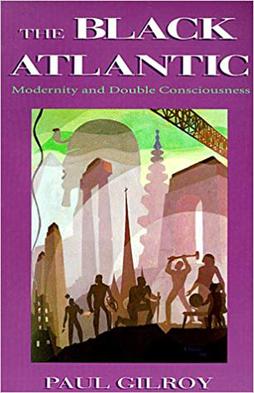West Coast hip hop is a regional genre of hip hop music that encompasses any artists or music that originated in the West Coast of the United States. West Coast hip hop began to dominate from a radio play and sales standpoint during the early to-mid 1990s with the birth of G-funk and the emergence of record labels such as Suge Knight and Dr. Dre's Death Row Records, Ice Cube's Lench Mob Records, the continued success of Eazy-E's Ruthless Records, Dr. Dre's Aftermath Entertainment, and others.

The Universal Zulu Nation is an international hip hop awareness group formed by and formerly led by hip hop artist Afrika Bambaataa.
New musicology is a wide body of musicology since the 1980s with a focus upon the cultural study, aesthetics, criticism, and hermeneutics of music. It began in part a reaction against the traditional positivist musicology—focused on primary research—of the early 20th century and postwar era. Many of the procedures of new musicology are considered standard, although the name more often refers to the historical turn rather than to any single set of ideas or principles. Indeed, although it was notably influenced by feminism, gender studies, queer theory, postcolonial studies, and critical theory, new musicology has primarily been characterized by a wide-ranging eclecticism.

IAM is a French hip hop band from Marseille. Formed in 1989, it comprises Akhenaton, Shurik'n, Khéops, Imhotep and Kephren. IAM has several meanings, including Invasion Arrivée de Mars. Another meaning is Imperial Asian Man, while AKH often refers to L'homme Impérial Asiatique.

David Toop is an English musician, author, curator, and emeritus professor. From 2013 to 2021 he was professor of audio culture and improvisation at the London College of Communication. He was a regular contributor to British music magazine The Wire and the British magazine The Face. He was a member of the Flying Lizards.
Ed Guerrero is an American film historian and associate professor of cinema studies and Africana studies in the Department of Social and Cultural Analysis at New York University Tisch School of the Arts. His writings explore black cinema, culture, and critical discourse. He has written extensively on black cinema, its movies, politics and culture for anthologies and journals such as Sight & Sound, FilmQuarterly, Cineaste, Journal of Popular Film & Television, and Discourse. Guerrero has served on editorial and professional boards including The Library of Congress' National Film Preservation Board.
Fun-Da-Mental is a British multi-ethnic hip-hop–ethno-techno–world fusion music group formed in 1991. The group is notable for its energetic fusion of Eastern and Western musical forms, for its outspoken political stance, and for its strong Islamic affiliation and advocacy. Fun-Da-Mental's political stance has led to the group earning the label "the Asian Public Enemy". The group's work has led to international attention and collaborations with artists from Pakistan, South Africa and Siberia.

A video vixen is a female model who appears in hip hop-oriented music videos. From the 1990s to the early 2010s, the video vixen image was a staple in popular music, particularly within the genre of hip hop. The video vixen first came around in the late 1980s when the hip-hop culture began to emerge into its own lifestyle, although was most popular in American popular culture during the 1990s and 2000s. Many video vixens are aspiring actors, singers, dancers, or professional models. Artists and vixens have been criticized for allegedly contributing to the social degradation of black women. Latinas are also degraded and hyper-sexualized in hip hop music videos because they are seen as objects of sexual desire in rap music videos.
Chickenhead is an American English slang term that is typically used in a derogatory manner toward women. The term mocks the motion of the head while performing oral sex on a man, but contains social characteristics and cultural relevance as well, and is frequently heard in popular hip hop music. More recent uses of the term have seen it taken back by hip hop feminists and entertainers as a symbol of sexuality and power. "Chickenhead" is also a term used in overseas sex trafficking for individuals that facilitate and monitor a person's transition into sex work.
The following events related to sociology occurred in the 1990s.
Elayne Antler Rapping was an American critic and analyst of popular culture and social issues. She authored several books covering topics such as media theory, popular culture, women's issues, and the portrayal of the legal system on television. As a regular contributor to such publications as The Nation, The Progressive, and The New York Times, she wrote on a wide variety of cultural issues including film and movie reviews.
Misogyny in rap music refers to lyrics, videos, or other aspects of rap music that support, glorify, justify, or normalize the objectification, exploitation, or victimization of women. It is an ideology that portrays women as objects for men's ownership, use, or abuse. It diminishes women to expendable beings. It can range from innuendoes to stereotypical characterizations and defamations.

Tricia Rose is an American sociologist and author who pioneered scholarship on hip hop. Her studies mainly probe the intersectionality of pop music and gender. Now at Brown University, she is a professor of Africana Studies and is the director of the Center for Study of Race and Ethnicity in America. Rose also co-hosts a podcast, The Tight Rope, with Cornel West.
Hip hop feminism is a sub-set of black feminism that centers on intersectional subject positions involving race and gender in a way that acknowledges the contradictions in being a black feminist, such as black women's enjoyment in hip hop music and culture, rather than simply focusing on the victimization of black women in hip hop culture due to interlocking systems of oppressions involving race, class, and gender.
Hip hop studies is a multidisciplinary field of study that encompasses sociology, anthropology, communication and rhetoric studies, religious studies, cultural studies, critical race theory, missiological studies, art history, dance, musicology, ethnomusicology, music theory, and gender studies. The term "hip hop studies" began circulating in the mid-2000s, and though it is not clear who first coined the term to label the field, the field of hip hop studies is often cited as having been crystallized by the publication of That's the Joint!: The Hip Hop Studies Reader in 2003. That's the Joint! includes approximately 25 years of scholarship, criticism, and journalism. The publication of this anthology was unprecedented, and highlights the evolving and continuous influence of "one of the most creative and contested elements of global popular culture since its advent in the late 1970s." The publication of the first edition of That's the Joint! marked a consolidating moment for the field of hip hop studies because it brought together key writings on hip hop from a diversity of hip hop authorities.
Feminist activism in hip hop is a feminist movement based by hip hop artists. The activism movement involves doing work in graffiti, break dancing, and hip hop music. Hip hop has a history of being a genre that sexually objectifies and disrespects women ranging from the usage of video vixens to explicit rap lyrics. Within the subcultures of graffiti and breakdancing, sexism is more evident through the lack of representation of women participants. In a genre notorious for its sexualization of women, feminist groups and individual artists who identify as feminists have sought to change the perception and commodification of women in hip hop. This is also rooted in cultural implications of misogyny in rap music.

The Black Atlantic: Modernity and Double Consciousness is a 1993 history book about a distinct black Atlantic culture that incorporated elements from African, American, British, and Caribbean cultures. It was written by Paul Gilroy and was published by Harvard University Press and Verso Books.
The lack of respect that black women received in the music industry gave rise to hip-hop feminism, as singers such as Monie Love brought attention to the differences in acknowledgment that exist even for equal talent. The movement tackles problems arising from deindustrialization, racial wealth disparities, and conservative backlash. It was molded by the social environment of the 1980s and 1990s. Me'Shell Ndegeocello an American rapper, singer and bassist and Angie Stone a singer are two artists that have shaped the conversation. Hip-hop feminism goes beyond gender issues to support the rights of women, African Americans, and LGBTQ people. Prominent figure in the genre Queen Latifah used "the politics of respectability" to promote women's rights and racial empowerment. Ndegeocello is one of the rising queer feminists of color who brings a nuanced viewpoint to problems like abortion and unjust beauty standards. Changes in perspectives are reflected in the transition from male-dominated hip-hop to women-centered hip-hop soul, which allows for a diversity of narratives within black communities. The Grammy-winning song "U.N.I.T.Y." by Queen Latifah was a historic moment that validated the powerful voice of black women in a male-dominated field and sparked discussions about domestic abuse and the commodification of black women's sexuality.
Music and Black liberation refers to music associated with Black political movements for emancipation, civil rights, or self-determination. The connection between music and politics has been used in many cultures and was utilized by blacks in their struggle for freedom and civil rights. Music has been used by African Americans over the course of United States history to express feelings of struggle and hope, as well as to foster a sense of solidarity to aid their fight for liberation and justice. African Americans have used music as a way to express their struggle for freedom and equality which has spanned the history of the United States which has resulted in the creation and popularization of many music genres including, jazz, funk, disco, rap, and hip hop. Many of these songs and artists played pivotal roles in generating support for the civil rights movement.
Penny Marie Von Eschen is an American historian and Professor of History and William R. Kenan, Jr. Professor of American Studies at the University of Virginia. She is known for her works on American and African-American history, American diplomacy, the history of music, and their connections with decolonization.






